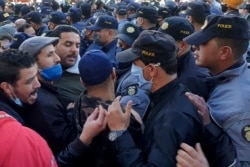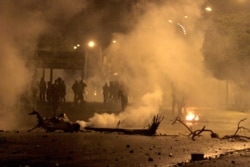Riots and looting were reported late Monday in a number of Tunisian towns and cities, leading to the arrests of nearly 600 people. Widespread rioting began early Sunday, days after the country marked the 10th anniversary of the resignation of long-time President Zein el Abidine Ben Ali in Tunisia's 2011 Arab Spring revolution. The riots also came as Prime Minister Hichem Mechichi announced a major ministerial reshuffle Saturday.
Tunisian security forces fired teargas at crowds of protesters Tuesday afternoon in the center of the capital Tunis as they marched toward the Interior Ministry, demanding the release of those arrested after three nights of rioting and looting in towns and cities across the country.
Crowds of young men attacked and looted businesses, government offices and banks again Monday night. Security forces arrested about 600 people in the wake of violence and demands by the public to protect private property.
Tunisian President Qais Said walked the streets of Tunis Monday to urge young people to demonstrate peacefully and not to attack public or private property.
He told a crowd of young people they have the right to express their opinions peacefully but asked them not to attack public or private property when they do so.
Ayashi Zamal, a member of the Tunisian parliament, told Al Hurra TV that "social and economic conditions in the country have deteriorated due to the COVID-19 crisis and that people are angry because politicians are playing political games instead of addressing the problems of ordinary people."
Egyptian political sociologist Said Sadek, who is in Tunisia, tells VOA that rioting has become a regular event each year to mark the 2011 fall of the Zein el Abdine Ben Ali regime.
"Those kind of riots are expected every year since the revolution. Before the revolution you would not be able to do what they were doing today because the Ben Ali regime was a police state and they would not allow this to happen," he said.
Sadek argues that discord between the country's three top leaders, President Qais Said, Prime Minister Hichem Mechichi and parliament speaker Rashid al Ghanouchi, who heads the Islamist al Nahda Party, is a major factor behind the latest disturbances.
Khattar Abou Diab, who teaches political science at the University of Paris, tells VOA that some analysts are calling the latest rioting a new Arab Spring revolution, not unlike the one that shook Tunisia, Egypt, Syria, and Libya in 2011, but he doubts that is the case.
He says this is not a resumption of the Arab Spring but rather ordinary disturbances caused by poverty, marginalization, and despair. Young people, he argues, expected change after the Ben Ali regime fell and now all they see is a black hole.
The Muslim Brotherhood's "Al-Nahda Party" he says "is trying to make itself into the main powerbroker in Tunisia and would like to set up an authoritarian regime under the camouflage of a multi-party system."
Abou Diab goes on to argue, however, that Al-Nahda "has lost much of its clout since the fall of the Ben Ali regime, along with many of its members and a good part of its credibility." Nevertheless, he adds, "they're still good at political maneuvering."
Tunisian government announced a four-day lockdown last week, which it said was due to a surge in the number of COVID-19 cases. Some analysts, however, say the lockdown is meant to prevent possible violence on the 10th anniversary of the January 14 departure of former president Ben Ali.
Tunisia has been facing serious economic problems in the 10 years since the departure of Ben Ali, and the recent COVID-19 crisis has left the country with a budget shortfall.
The first "Arab Spring" revolution broke out in Tunisia in December 2010 after a young vegetable seller by the name of Mohammed Bouazizi set himself on fire to protest economic conditions and alleged police brutality.






